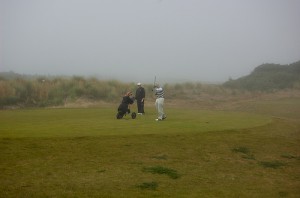10,000 hours later: the PGA Tour?
Last spring, I jokingly (okay, maybe half-jokingly) wrote about my quest to make the Champions Tour, the professional golf tour for people over the age of 50. In that post, I made reference to the ideas of Anders Ericsson, an old friend whom Dubner and I wrote about in our New York Times column back in 2006, and whose ideas later became the centerpiece of a number of popular books. Anders is the one who thinks that talent is unimportant. Oversimplifying a bit, he argues that with 10,000 hours of the right kind of deliberate practice, more or less anyone can become more or less world-class at anything. I’ve spent 5,000 hours practicing golf, so if I could just find the time for 5,000 more, I should be able to compete with the pros. Or at least that is what the theory says. My scorecards seem to be telling a different story!
It turns out I’ve got a kindred spirit in this pursuit, only this guy is dead serious. A few years back, twenty-something Dan McLaughlin decided he wanted to play on the PGA tour. Never mind that he had only played golf once or twice in his life and had done quite poorly those times. He knew the 10,000 hour argument, and he thought it would be fun to give it a test. So he quit his job, found a golf coach, and has devoted his life to golf ever since. So far he is 2,500 hours into his 10,000 hour quest, which he chronicles at thedanplan.com.
I happened to find myself at Bandon Dunes, the golfers’ haven on the Oregon coast, a while back. I met Dan there, and we had the chance to play 36 holes together. We had a great time, and it was fascinating to get to know him and hear about his approach.
The golf pro who has been guiding him had a very unusual plan, to say the least. For the first six month of Dan’s golfing life, he was only allowed to putt. We are literally talking about Dan standing on a putting green for 6-8 hours a day, 6 or 7 days a week, hitting one putt after another. That is nearly 1,000 hours of putting before he ever touched another club. Then he was given a wedge. He used just the wedge and the putter for another few months, before he got an 8 iron. It wasn’t until a year and a half into his golfing life – 2,000 hours of practice – that he hit a driver for the first time.
I understand the basic logic of starting close to the hole (most shots in golf, after all, do occur close to the hole), but to my economist’s mind, this sounds like a very bad strategy for at least two reasons. First, one of the most basic tenets of economics is what we call diminishing marginal returns. The first little bit of something yields big returns; the more you do of something, the less valuable it is. For example, the first ice cream cone is delicious. The fourth is nauseating. The same must be true of putting. The first half hour is fun and engaging. By the eighth straight hour, it must be mind-numbing. I just can’t imagine a person could focus that single-mindedly on putting, not just one day, but for months and months on end. Second, my own experience suggests that there are spillovers across different aspects of golf. Things you feel when chipping help inform the full swing. Sometimes I can feel what I should be doing with a driver, and that helps me with my irons. Sometimes it is the opposite. To be putting and chipping for months without any idea what a full swing is – that just seems wrong to me.
So is the strategy working? Dan is 2,500 hours into his experiment, he is still really excited about golf, so that is a victory in and of itself. He is an 11 handicap, which means he is about 15-16 strokes per round away from being good enough for the PGA tour. That means he has to shave off about one stroke for every 500 hours of practice from here on out. I suspect he can keep that rate of improvement for the next few thousand hours, but it will be a tough haul after that.
Whatever the outcome, I’ll be rooting for him. Partly because he is a nice guy, and partly because he promised me free tickets to the 2016 U.S. Open, but only if he qualifies.


Comments